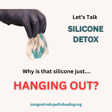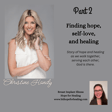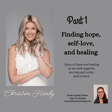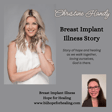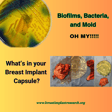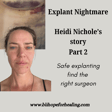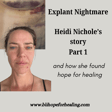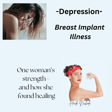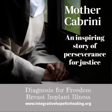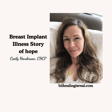Become a Creator today!Start creating today - Share your story with the world!
Start for free
00:00:00
00:00:01

Autoimmune and Neurological Breast Implant Illness
(Graphic Surgery Content) Julia Marie shares her story about having breast implant illness with autoimmune (ASIA) and neurological symptoms. After having 3 surgeries to remove the implants, capsules, and scar tissue, she is on her way to healing!
Transcript
Introduction to the Podcast
00:00:05
Speaker
Hello, welcome to Breast and Flight, All This Hope for Healing. This is Cecily Henderson, your host. Thank you for joining us today.
Julia's Journey Begins
00:00:12
Speaker
I'm here with Julia Marie here in Michigan with and Bloomsfield Hill, and we are going to discuss a little bit about what's going on, why we're here together, and just some some very heart wrenching, uplifting, hopeful things that we wanted to to share with you today. So Julia and Marie, if you could just let us know a little bit about why you're here and why I'm here. and Yeah, I try.
00:00:43
Speaker
Well, I came all the way from Germany to be here, to be able to be here. My whole family supported me, Cecily supported me. A lot of people in the group supported me, so I'm very thankful for that opportunity. um My name is Julia Marie.
Decision and Initial Symptoms
00:01:04
Speaker
I'm from Germany, and I'm 36 years old. I'm a mother of two, and yeah.
00:01:11
Speaker
I got very harmed by silicone press implants. Well, yeah, it was back in 2020. I was very, very, very sporty in that time. During that time, um I was very, very healthy, like exercising a lot. I lost a lot of weight. I had two children at home, so yeah yeah and then I decided one day I'm getting a consultation with a plastic surgeon in my area and I had that appointment with him and he said well it's going to be so perfect and yeah he measured everything and he told me well um the problem is not like your
00:02:05
Speaker
small volume the problem is your wide area here like you have a very wide back and shoulders and that's why you don't have like any volume to the front so i would recommend giving you 550 cc implants to just like give you some volume to the front and i agree yeah i got it done and it was like the implanting Surgery was a nightmare. I think everyone can compare.
00:02:40
Speaker
Well, how big were you before you had the implant? I had um like A to B and after that I had a double D. like yeah wow So they were halfway under the muscle, which is pretty uncommon in the US I heard. The technique is called dual plane, where they divide your breast muscle halfway. So the upper part is sitting under the muscle and the lower part is sitting over the muscle.
00:03:09
Speaker
Well, yeah, so then I recovered from that surgery and yeah, I lived with it like I didn't recognize what it did to me. But today I know that I had symptoms from the beginning on. Now you were telling me that your mom kind of told you that that she thought you had BII. Yeah. Well,
00:03:38
Speaker
I didn't recognize myself.
Health Decline Post-Vaccination
00:03:43
Speaker
What I experienced was aches and pains here and there, getting tired here and there, um having concentration, like memory issues here and there from the beginning on. Now you told me you were even on a little bit of a denial for a bit, right? You were trying to say that it was either Well, people with MS have this, or people with other things, and it's just normal. Well, yeah. It was in 2022 when everything like got really, really bad and really worse. I had the COVID vaccines done. And after that, really, it was a downhill race. Well, my whole body collapsed.
00:04:37
Speaker
i had um breathing issues. I had muscle weakness. i um Sometimes my legs got paralyzed.
00:04:49
Speaker
um I couldn't think, I couldn't remember sometimes what year we had. I couldn't finish a single sentence. Sometimes my my cognition was so bad.
Medical Dismissal and Research
00:05:01
Speaker
I had to talk in one words with the people around me or on the phone because I wasn't able to bring out a normal sentence. I had so much pain all over my body. I had muscle pain, I had nerve pain. So they assumed I had very bad shingles.
00:05:20
Speaker
because of the pain, then they assume maybe you've got Lyme. And these are the doctors that you went to in Germany, correct? Yeah, I went from doctor to doctor. um I saw double sometimes. I had ocular migraines. um I had tremor attacks so bad I couldn't write on my phone because my hand was so shaking so badly. I couldn't eat properly.
00:05:49
Speaker
um I had excessive attacks of thirst and nothing would help like I would drink one gallon of water in didn't like crunch my thirst.
00:06:02
Speaker
I had a constant runny nose. I still have all of this. Yeah. Yeah. And then at some point it was clear that no one could help me because I was in a hospital very often.
00:06:23
Speaker
They did tests with me. They found I had 20 lesions in my brain. um They found I had a chronic central nervous system inflammation. They found I had, my reflexes were not as healthy as they should be.
Explant Surgery and Relapse
00:06:47
Speaker
and they did like memory tests with me, I failed, and so on. But they always would discharge me from the hospital without any diagnosis. And you were telling me the doctors told you that it was just psychosomatic, right? It was all in your head. Yeah, that's what I often heard. When I had a tremor attack, I went to the ER, r or I went to the ER because I couldn't breathe or because I had heart palpitations and the problem was once I got there maybe the attack was gone and I just told them what I experienced and they said well this is psychosomatic I said no it's not like it's real I'm experiencing like all of this
00:07:39
Speaker
so they were just overwhelmed by all those symptoms and the last clinic i've been to and there was a young doctor and i already did some research with my mom because my mom saved my life basically i would have died with her without her and um we talked to the to the doctor because of all that inflammation in my brain. We talked about the Asia syndrome with him.
00:08:17
Speaker
And he told me, well, he doesn't believe in all of that. Asia Syndrome giving like MS-like symptoms.
00:08:28
Speaker
Well, I had so many symptoms. My vision was so bad. I couldn't feel. My whole body, my numbness was so taken over the place, right? That it was, in the end, it was an emergency.
00:08:48
Speaker
um x plan and i also paid for for an on-block of course because i knew that i can only get better with a proper on-block procedure yeah and after my implants have been taken out i got better for two or three weeks it took a little while like two three weeks and then i felt better And I started to work again. And yeah, living my normal life. And then I broke down, basically. All the symptoms came back. I felt like having COVID all the time. My breasts hurt so
Documenting the Journey
00:09:34
Speaker
bad. I had nerve pain again. I had heart palpitations. I had my runny nose. I had three more attacks. I had ocular migraines.
00:09:47
Speaker
yeah and my whole immune system crashed again so yeah long story short I saw that second surgeon and I decided to get the capsules removed and yeah paid a lot of money again oh my gosh yeah because I'm doing this for my children right and for my job which I love and yeah so I decided to get it done as soon as possible And again, I had a contract for having an on-blog. Capsulectomy. Getting photos and all that stuff. Yeah. Oh my gosh, your story's heartbreaking. So you have to tell us what happened. Well, in the end, I didn't get anything and I didn't get any better.
00:10:44
Speaker
And... yeah so what i have been told was that the surgery was pretty bloody and that everything was still inside and everything has been taken out right yeah so there are really many many women that keep being sick after explant just because they didn't get a proper explant, right? Yeah, because here you are going through twice, right? Trying to get your implants, trying to get resolution. Yeah, it's now been like ah half a year when I had that second surgery done. I did some investigations with
00:11:38
Speaker
Cecily and we had some measurements from my pathology report, which was the only one I had, the only opportunity I had to see something like what was taken out, which led to the point that Cecily told me, sorry, this is all not normal. I think you have to see Dr. Kahn. Yeah, it's tomorrow I have my pre-op and the day after tomorrow,
00:12:08
Speaker
My surgery will be and I think we are very, very curious what he's going to find.
00:12:18
Speaker
Well, yeah, I think shouldn't be that less. Yeah, it's going to be really interesting.
Post-Explant Challenges
00:12:30
Speaker
We're going to document. I'm going to make sure to record and document everything that Julia Marie is going through and you know just go through her story because I'm sure I know that so many women are going through similar situations and their stories just not being heard.
00:12:48
Speaker
You've, you know, you've ex-planted and you feel like you should be getting better or you haven't ex-planted and you think that it's something else. You just, you need to feel like you're not alone. It's not just in your head. There is something going on. Listen to your body. Listen to your mind and your heart because it's telling you something. And, you know, thankfully, Julia, she listened to what her heart was saying. You know, my experience says that each treatment out there In my case, it won't have any effect if your surgery wasn't done right. I had four blood washes done. I had high amounts of silicone in my blood, yes, but the local reaction never, never went away from me. I tried everything like supplements, I tried IV treatment, I tried good
00:13:47
Speaker
like food and everything, like detoxing. I tried sauna, I tried, you know, like zeolite, like everything. And did you get worse? Like even sometimes you would get worse. Yeah, when I detoxed and I tried to detox, like I used something like chlorella or any other chelators I got or like NAC.
00:14:15
Speaker
I got so bad, I can't take it. So this made me think of why is it like that? So is to get that education out to doctors, which I think is the key. Right. So that when women approach them, hey, I have all these symptoms, they can say, oh, well, hey, do you have breast implants? Right. That that should be on a questionnaire form for a health history form so that doctors, when they talk to women and say, hey, you have all these symptoms,
00:14:45
Speaker
Do you have breast implants? And that's what should happen. And that's the goal is to get that on. Yeah. And what's really important in the Asia syndrome to know is that it mimics other autoimmune issues or conditions, right? So you have to understand that Asia is an immune response to a foreign substance in your body.
00:15:11
Speaker
And it's really, really hard to diagnose. Yeah. Well, and my neurologist, so I was diagnosed with CIDP. Yeah. Because we had talked about, which has paralyzed me for seven years. And I had to walk with a walking aid. Yes. I mean, so many women, it's affecting our nervous system. And they did the tests on me, and they came back positive. I had CIDP. I had it.
00:15:40
Speaker
The silicone was causing problems with my nervous system, damaging my nerves and my Mayan sheaths. That's just what was happening because once I took out my implants a year later, I was walking. My neurologist, when I talked to her, she's like, Cecily, you made me a believer. Breast implants cause neurological conditions. That's what she told me.
00:16:04
Speaker
so We just need the research out there because you're absolutely right. People can be diagnosed with these different diseases and still become positive for these different diseases, but it could be where's the root cause, right? What's causing it? Well, not only the the silicone is neurotoxic, right? Also the immune system.
00:16:26
Speaker
attacks itself, attacks its own cells, and also the antibodies being produced against the foreign substance. They are also doing harm to the organs.
Hope and Advice for Others
00:16:40
Speaker
So it's really the whole body is attacked. Those are some really great points.
00:16:49
Speaker
Because the reaction, the autoimmune reaction, then the silicone on top of that, it just creates a whole whirlwind of health problems and that is very difficult to diagnose.
00:17:05
Speaker
I am excited. I have a lot of feelings, excited, um anxious, like a little mother hen, you know, but I know everything's going to be okay. And we're going to get you through this and keep everybody updated with how she's doing, with how Julia Marie's doing. and Thank you so much, Julia. Appreciate you being here. Such a sweetie. Thank you.
00:17:30
Speaker
Thank you for the opportunity really. um I can't wait to get my life back finally after suffering for so long and I really I'm not making anything up you know. I am i am having a very responsible job and i I pray for like being honest every day so I'm talking from my heart if I say like this is all true and just like don't get those implants if you want to stay healthy. I read a quote that breast implants are suicide for your natural breasts and this is really true this this affects like everyone like really they will rupture. ah You will have second, third, fourth,
00:18:19
Speaker
surgeries like even if you tolerate the silicone you will get more and more and more surgeries and don't do it just don't do it stay natural like God made you make the best out of you and yeah stay beautiful as you are, because sometimes the outcome when you have done like something like that is really, yeah, worse.
Conclusion and Farewell
00:18:55
Speaker
Thank you for that beautiful message that I love that. That's really beautiful. Well, thank you so much for joining us, everybody. And please remember that there is hope in healing. Anyway, God bless.

